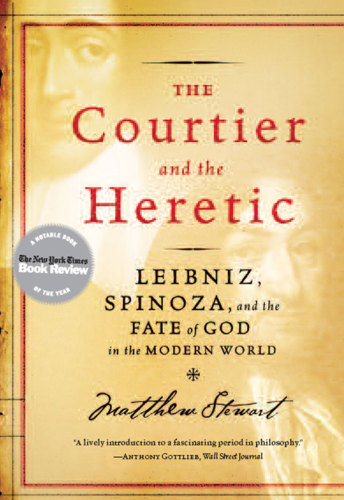
The Courtier and the Heretic
Leibniz, Spinoza, and the Fate of God in the Modern World
کتاب های مرتبط
- اطلاعات
- نقد و بررسی
- دیدگاه کاربران
نقد و بررسی

Starred review from August 15, 2005
According to Nietzsche, "Every great philosophy is... a personal confession of its creator and a kind of involuntary and unperceived memoir.". Stewart affirms this maxim in his colorful reinterpretation of the lives and works of 17th-century philosophers Spinoza and Leibniz. In November 1676, the foppish courtier Leibniz, "the ultimate insider... an orthodox Lutheran from conservative Germany," journeyed to The Hague to visit the self-sufficient, freethinking Spinoza, "a double exile... an apostate Jew from licentious Holland." A prodigious polymath, Leibniz understood Spinoza's insight that "science was in the process of rendering the God of revelation obsolete; that it had already undermined the special place of the human individual in nature." Spinoza embraced this new world. Seeing the orthodox God as a "prop for theocratic tyranny," he articulated the basic theory for the modern secular state. Leibniz, on the other hand, spent the rest of his life championing God and theocracy like a defense lawyer defending a client he knows is guilty. He elaborated a metaphysics that was, at bottom, a reaction to Spinoza and collapses into Spinozism, as Stewart deftly shows. For Stewart, Leibniz's reaction to Spinoza and modernity set the tone for "the dominant form of modern philosophy"—a category that includes Kant, Hegel, Bergson, Heidegger and "the whole 'postmodern' project of deconstructing the phallogocentric tradition of western thought." Readers of philosophy may find much to disagree with in these arguments, but Stewart's wit and profluent prose make this book a fascinating read.

July 1, 2014
Stewart examines the philosophical mind-sets of the Founding Fathers in this sprawling, ambitious, and ultimately rather compelling paean to the role of reason in the American republic. In large part, Stewart seeks to remind readers that, despite claims to the contrary by evangelicals and others, the Founding Fathers were for the most part deists, which is to say that they were not Christians but, rather, adhered to an ancient, pagan and continental philosophy that involves a creator of some sort but radically asserts that we the people are and always have been the source of our own authority. It was this rejection of divine authority and not merely the political rejection of the British, suggests Stewart, that made the American Revolution truly revolutionary. To support his argument, he provides deep context, describing the philosophical climate of the late eighteenth century but also probing the various philosophical writings of key founders, including a few who do not get the attention they deserve. The result is a deeply felt and richly argued polemic that will challenge readers to reexamine the philosophical basis of American thought.(Reprinted with permission of Booklist, copyright 2014, American Library Association.)

























دیدگاه کاربران